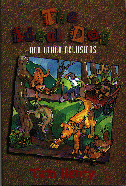


|
The Ideal Dog and Other Delusions.
Tom Henry. Subject Headings:
Adult. **1/2 /4
|

excerpt:
No sensible child will work when it snows, including Lily. The only way I can get her to take on a chore is to talk to her for twice as long as it takes to do the job. If the job has anything to do with stacking wood, then the ratio is three to one. That morning, Lily's task was to rake snow from the chicken run, so the chickens could see their seed. We talked about why it needed to be done, and about what was going to happen if it didn't get done, i.e. no snowball fight. Finally she picked up the rake and started. The snow she was raking looked like waves, she said. Then, pausing to gaze at the untrampled hay field, she said it looked like ripples, or skin on a wrinkly grandparent. With the rake at full stop, the images came on: water, skin, feelings; metaphors heaping on top of one another like drifts. When I interrupted with a reminder that the job was not getting done, she announced her hands were frozen.This is Tom Henry's third book. His first two, The Good Company and Dogless in Metchosin, won British Columbia writing awards and The Ideal Dog bids fair to win another.'Think of something else,' I said, 'and you won't feel the cold.'
She paused a moment, head tilted, looking to the left, her trademark thinking stance. Then she dropped the rake. 'Can't. My mind just pushes the thoughts away,' she replied. 'Besides, I want to think about the cold.'
I can understand that. In our temperate, rainy, sodden, sloppy winters, a rare thing like snow is not to be ignored. It is something to dwell on all the day.
With this collection of anecdotes gleaned from his life in the rural community of Metchosin on Vancouver Island, Henry raises a longing in readers to share a similar lifestyle. He has chosen a hard way to earn his living - gardening, cutting down trees, stacking firewood, clipping hedges - and his keen-eyed observations of the seasons, animals, people and daily routines will bring waves of nostalgia to readers. It also might surprise city dwellers that such an existence as Henry's is possible today.
Tom Henry's wife is Lorna Jackson, who is also a writer. She and their small daughter Lily are often included in these tales, creating an impression of a warm family relationship. I particularly enjoyed descriptions of Lily's participation in a few of her father's activities, and his deep interest in her reactions to various situations.
I have one criticism. Why do modern male writers find it necessary (or macho?) to use ugly words that describe unattractive bodily functions? Is it a paucity of vocabulary? I can't imagine a Dickens, or even a Robertson Davies dropping such words casually into their writing. Why do they seem so magnetic to today's writers?
The Ideal Dog's short selections are divided into seasonal groups: "Fall of the Leaf", "Winter Rains", "Seed Time", and "Dog Days." In its entirety The Ideal Dog gives a good picture of life in the Vancouver Island countryside.
Recommended.
Joan Payzant is a retired teacher and teacher-librarian, living in Dartmouth, Nova Scotia.

To comment on this title or this review, send mail to cm@umanitoba.ca.
Copyright © 1997 the Manitoba Library Association. Reproduction for personal use is permitted only if this copyright notice is maintained. Any other reproduction is prohibited without permission.
Published by
The Manitoba Library Association
ISSN 1201-9364
AUTHORS |
TITLES |
MEDIA REVIEWS |
BOOKSHELF
BACK ISSUES |
SEARCH |
HOME